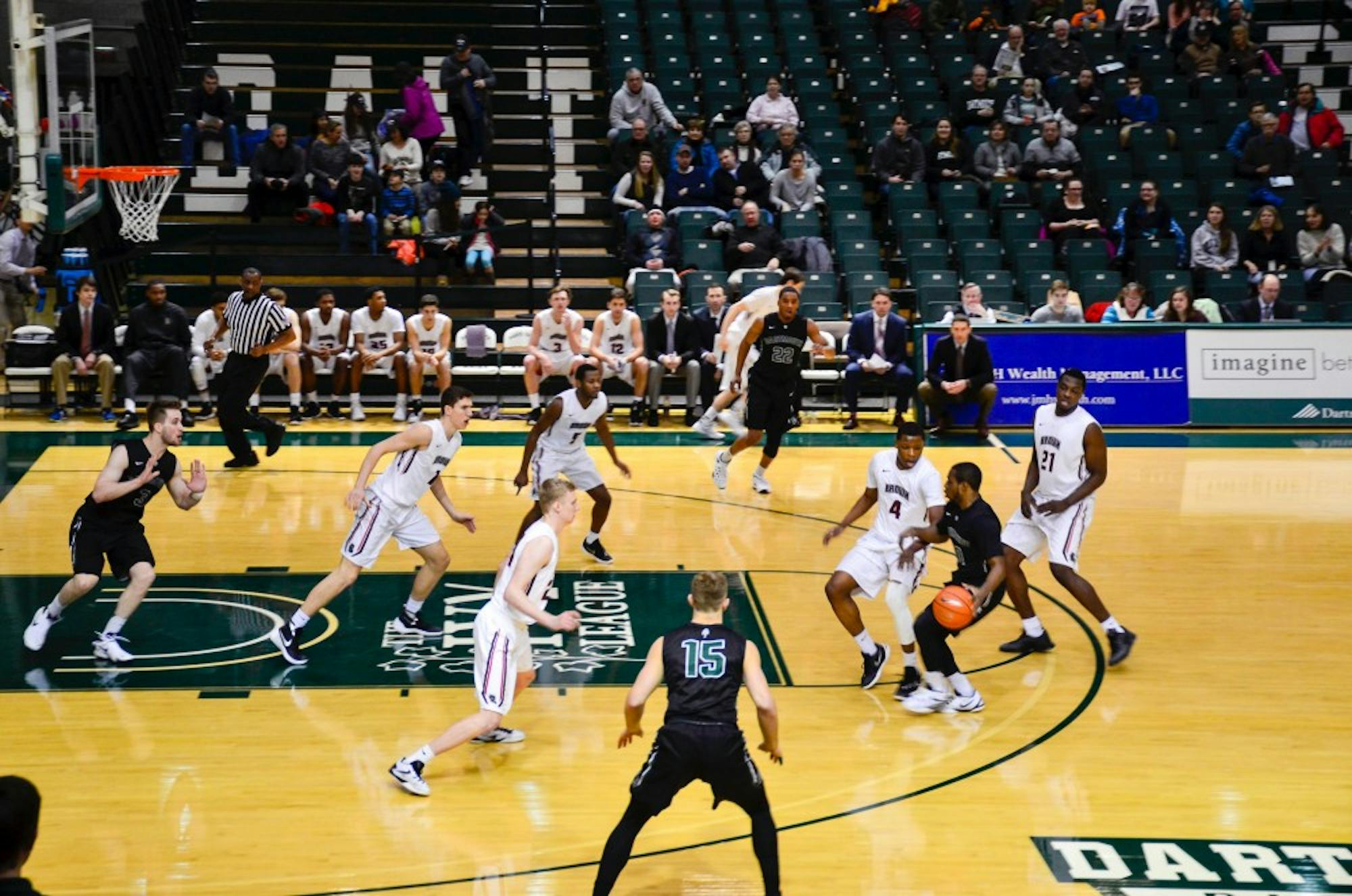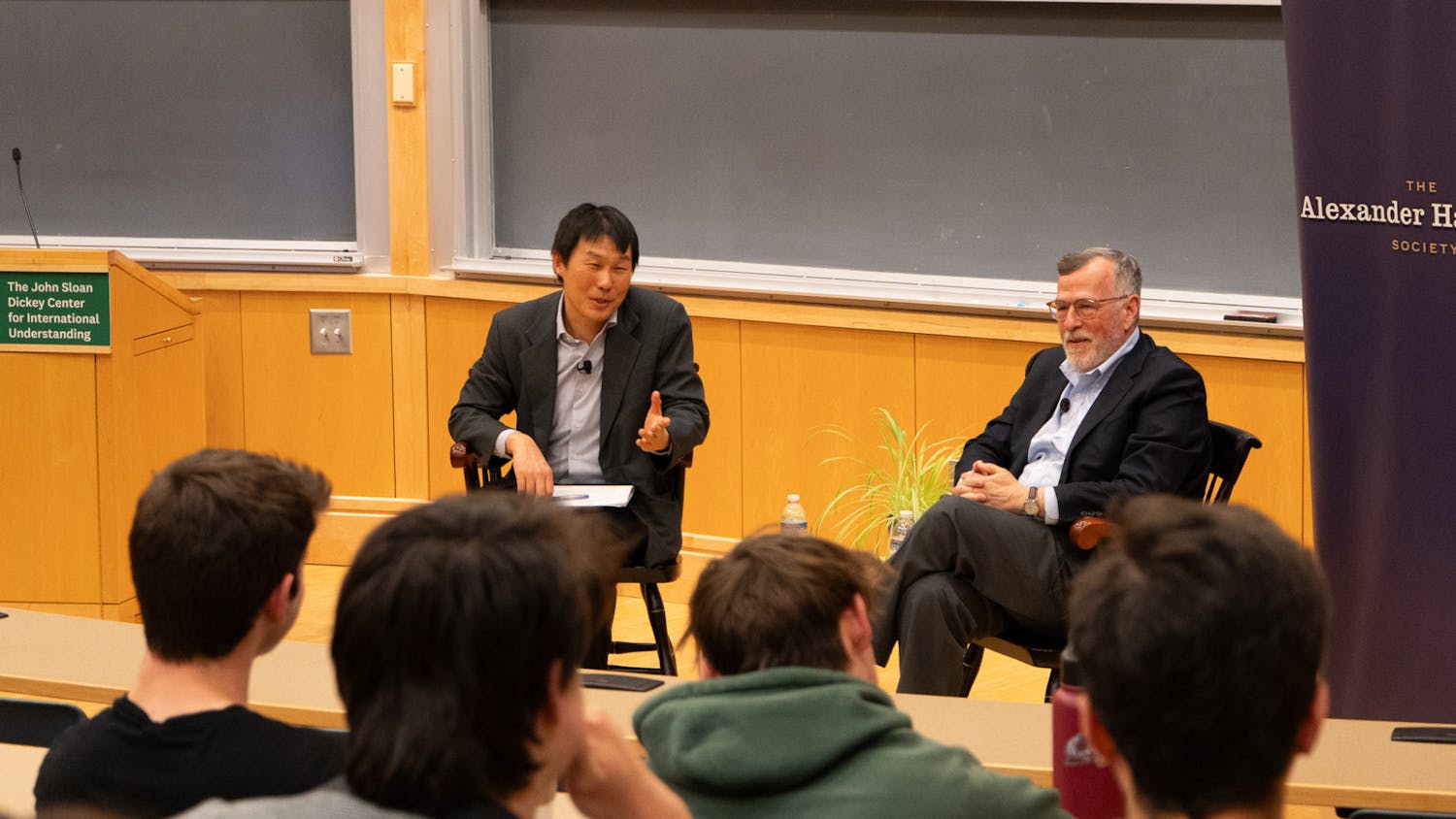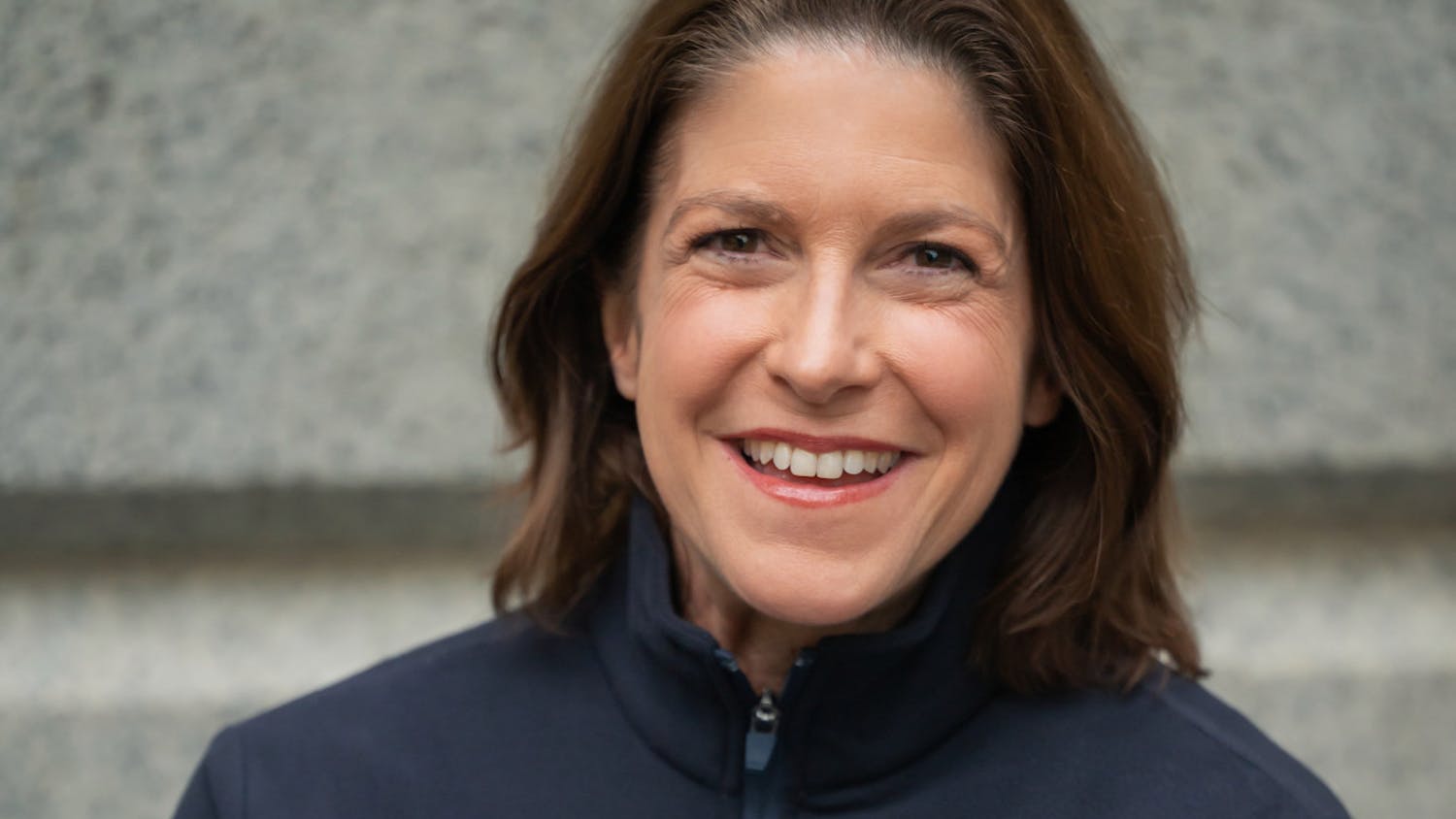Dartmouth’s men’s basketball started off the season trying to prove all of the team’s doubters wrong. A panel of media representatives predicted the Big Green to finish seventh in the Ivy League this season, only ahead of Brown University. In addition, just a day before the season was set to begin, Dartmouth’s standout forward Evan Boudreaux ’19 officially announced that he would forgo the 2017-2018 season and play at Xavier University as a graduate transfer for two years, starting next season. With Boudreaux’s All-Ivy second team performance and a 7-20 overall record in 2017, many wondered how the Big Green would turn the team around.
In short, the team has struggled. In addition to Boudreaux’s departure, the team lost one of its offensive cornerstones, Guilien Smith ’19, indefinitely due to a hand injury. The underclassmen, as a result, have had to step up and take on larger roles. Taylor Johnson ’18 and former Ivy League Rookie of the Year and current co-captain Miles Wright ’18 make up two of the five starting players, but the remainder of the major contributors for the Big Green have come from underclassmen. Forward Aaryn Rai ’21 has started 16 out of 17 games this season and is shooting .476 from the three — second best in the Ivy League . Brendan Barry ’20 is the team’s third-leading scorer behind Johnson and Wright. He is shooting .434 from behind the arc, good for fourth in the Ivy League, and .886 from the free-throw line. Chris Knight ’21 has come into his own as a jack-of-all-trades player. The team uses the 6-foot 7-inch first-year at both center and forward. He and fellow big man Will Emery ’20 are currently leading the team in offensive rebounding percentage (the proportion of a player’s offensive rebounds to the total number of offensive rebounds available while they were on the court), with 7.9 percent and 8.9 percent respectively. Dartmouth’s offense seems to be clicking with a good balance of stud underclassmen and senior leadership, so why has the team only won four games this season — three if you disregard Division III Emerson College.
The answer could stem from poor defensive play. Dartmouth’s defense has marred its offensive success this season, and it has hurt them in games where it counted. Dean Oliver, the first full-time statistician hired by the National Basketball Association, developed statistics in his book “Basketball On Paper” that theorizes why a team is good or bad. Oliver describes these “Four Factors,” which can be used to analyze one’s own team and one’s opponent:
• Shoot the ball and score: This is measured in “effective field goal percentage.” This can be viewed as standard field goal percentage but weighted to give slightly more credit to 3-point shots.
• Take care of the ball: This is measured in “turnover percentage,” literally the number of turnovers per number of possessions.
• Offensive rebounding: This is measured in “offensive rebound percentage,” which is calculated using the number of offensive rebounds per total rebounds.
• Getting to the foul line: This is measured in “free-throw rate,” which is the number of free throws attempted per field goals attempted.
Dartmouth’s biggest defensive struggle is the first and most important of the Four Factors, making the shot. Dartmouth’s defensive effective field goal percentage is 54.7 percent, which, according to College Basketball Statistics website KenPom.com, is ranked 316th out of 351 teams in Division I and last in the Ivy League. The analysis is simpler than you think — if the opposing team scores a lot of points, they will beat you.
There are two games that I think are perfect examples of Dartmouth’s play this year: the Dec. 19 loss to the University of Notre Dame and the Jan. 20 overtime loss to Harvard University.
Dartmouth’s matchup in South Bend, Indiana was, without a doubt, its toughest game of the year; however, Notre Dame, at the time, was in a slump. The Fighting Irish had lost three of its last five games that took them from No. 5 in the AP Poll down to No. 9. Notre Dame had a lot to fight for, and a loss to Dartmouth would be a big hit on its résumé come March. Both teams delivered a great matchup, but Notre Dame came out on top 97-87. Notre Dame senior Bonzie Colson, who is currently out with a foot injury, put up his 30th career double-double with a career-high 37 points. Four out of five of Notre Dame’s starters scored in double figures this game, but Notre Dame only recorded three points off its bench, compared to Dartmouth’s 32. Dartmouth also hit 15 3-point shots. When you put up a performance like that, you should win the game. However, you can’t let the other team score 97 points and expect to win.
The Harvard game was not an offensive shootout; it was a defensive brawl. Harvard’s team this year is characterized by two elements: stifling defense and a complete inability to shoot. This game went to overtime with both teams at 48 points. Dartmouth was able to keep up with Harvard, closing a 17-point lead to force overtime, but the Crimson kept scoring by using their size to get to the interior and make easy layups. According to KenPom, Dartmouth’s 2-point field goal percentage on defense is 55.3 percent, 325th out of 351 teams in Division I. Harvard exploited this, shooting 47.2 percent from two and 29.2 percent from three, compared to Dartmouth’s 44.4 percent from three. Dartmouth’s defensive play let the team down again. Despite Harvard’s inability to shoot, the Big Green could not make the necessary defensive adjustments to win this game.
Dartmouth is currently 4-13, having lost seven straight and dropping its first four Ivy contests. This upcoming weekend, Dartmouth travels to Cornell University, who currently sits at 7-10 overall and 1-3 in Ivy play on Friday, and Columbia University, who is 4-13 overall and 1-3 in conference play, on Saturday.
At first glance, one might think that the game against the Lions might be winnable by looking at their record. However, Columbia is the second “least lucky” team in the country, according to KenPom. This team had a streak of six games from Nov. 25, 2017 to Dec. 10, 2017 in which it lost by 10 points or less, including an overtime loss to the University of Connecticut and a four-point loss to University at Albany, SUNY. I would expect Columbia to finish in the middle of the pack in the Ivy League; although wouldn’t it be great if Columbia made the Ivy League tournament with its out-of-conference record.
My predictions for the four teams to make the Ivy Tournament this year falls somewhat in line with the standard teams at the top. For the past five years, three of the four teams to make the Ivy tournament or finish in the top four in the years without the tournament have been Harvard, Yale University and Princeton University. Currently, the top four in the conference are Harvard, the University of Pennsylvania, Princeton and Yale and Brown University tied for fourth. Yale is performing worse than predicted due to the injury of star player Makai Mason at the beginning of the season, but Brown’s Ivy record (2-2) includes some key wins. The Bears beat Yale and Dartmouth on its own turf by margins of one and two points, respectively. The fourth spot in the Ivy League is up for grabs, but I can reasonably see Columbia or Yale taking that spot at the moment. Both of these teams can shoot the ball fairly well. Yale is the best 2-point shooting team in the Ivy League and the 11th best nationally, better than Pacific-12 leader University of Arizona. Columbia is the second-best 3-point shooting team in the Ivy League behind Princeton, who will certainly make the tournament barring a total collapse, sporting an overtime road win over Pac-12 powerhouse University of Southern California. Neither Columbia nor Yale has a signature win on their résumé, but Columbia has already played its two toughest Ivy tests this season, losing to both Princeton and Penn on the road. It wouldn’t be surprising to see the Lions take advantage of an easy late-season schedule to make a push for that fourth spot. Their luck has to turn at some point, right?




